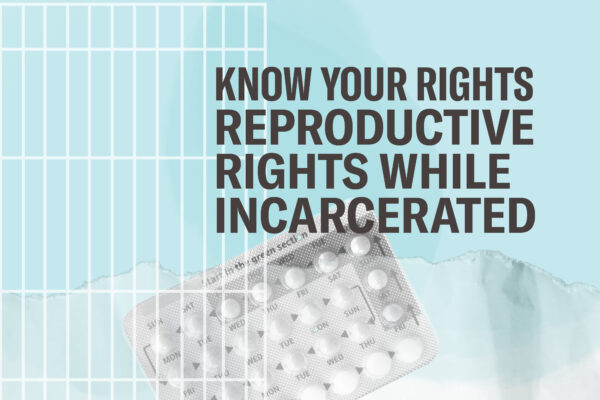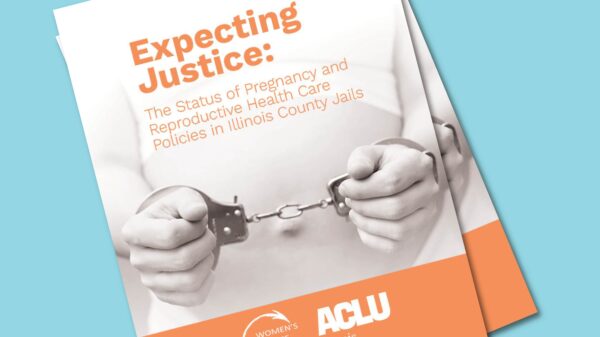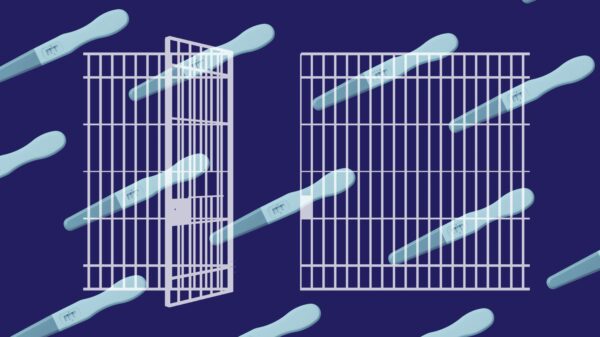When you’re in prison or jail, you still have the right to make decisions about your own body and reproductive healthcare. Jails and prisons can’t prevent you from making decisions about your own body, like whether to use birth control and whether to continue a pregnancy or have an abortion.
What do these rights mean?
Having the rights listed here means that jails and prisons can’t punish or threaten you for making these decisions about your body. It also means that if you have a right to a service or medications, the jail or prison has to provide you with that service or medications (like prenatal care and contraceptives).
If you think your reproductive rights have been violated while incarcerated, you can fill out our intake form, or email acluofillinois@aclu-il.org. Please be aware that if you are still incarcerated, any emails that you send may not be confidential. If you are still incarcerated and you prefer to send a confidential communication, you can mail a letter marked as LEGAL MAIL to:
Roger Baldwin Foundation of ACLU, Inc.
ATTN: WRRP
150 N. Michigan Ave., Suite 600
Chicago, IL 60601
Pregnancy and Related Healthcare:
Right to choose whether to have an abortion or to continue your pregnancy.
- If you are in a state prison, the Illinois Department of Corrections should cover the cost of an abortion procedure and associated expenses. If IDOC is refusing to do so, contact acluofillinois@aclu-il.org.
- If you are in a county jail, Illinois’ statewide abortion fund, the Chicago Abortion Fund (312-663-0338), and/or the National Abortion Hotline (1-800-772-9100) can help with paying for an abortion. The Chicago Abortion Fund may also be able to help with any additional travel costs, emotional support needs, and/or logistical needs you have. If you need help contacting these organizations, talk to your doctor, or contact acluofillinois@aclu-il.org.
- If you are on parole, probation, or pretrial supervision, the terms of your supervision should not create a barrier to you accessing an abortion if you choose. If you are experiencing challenges accessing abortion because of the terms of your parole, probation, or pretrial supervision, contact acluofillinois@aclu-il.org
Right to prenatal care.
- This can include things like getting prenatal vitamins and regular checkups with a doctor to make sure you are healthy, and to track any possible complications with your pregnancy.
- You also have the right to medical care if your pregnancy ends in a miscarriage.
Right to be provided at least 300 extra calories of food per day outside of regular mealtimes.
Right to educational programming about pregnancy and childbirth.
Right to a bed that is 3 feet from the floor or lower while you are pregnant.
Right not to be put in restraints at any time, unless the prison or jail believes you are likely to try to escape or pose an extraordinary safety risk, or unless a doctor or other health staff asks for you to be in restraints to protect you, your pregnancy, or someone else.
- Even if the prison or jail does use restraints on you, they can’t use leg irons, shackles, or waist shackles. They must remove all restraints and electronic monitoring devices immediately if requested by a doctor or nurse.
Right not to be put in solitary confinement while you are pregnant, unless you are a harm to yourself, your baby, or another person, or will attempt escape.
- If you’re in a state (or IDOC) prison, you have the right to be screened for eligibility for the Moms and Babies Program, a program that allows moms to spend time with their babies while they are still incarcerated.
- If you’re in a county jail (including Cook County Jail) and it’s close to your due date, you have the right to a hearing to determine whether your being in jail is necessary to protect the public or prevent you from fleeing, and if not to be released.
Birthing:
Right to make decisions about how you want to give birth.
- This can include deciding whether to have a c-section or whether to get an epidural or not.
- You have the right to refuse induced labor, even if the prison or jail wants you to do it for their convenience.
- You also have the right to consent to things like vaginal or cervical checks, and episiotomy. This means that doctors should talk to you and check with you before they do these things.
Right not to be put in non-therapeutic restraints of any kind during labor. This includes handcuffs, shackles, and any other restraints that were not requested by a doctor or other health staff in order to protect you, your pregnancy, or someone else.
- If you are on parole, probation, or pretrial supervision and are required to wear an electronic monitoring device, you have the right to have it immediately removed during labor and delivery.
Right not to have a correctional officer in your delivery room at the hospital while giving birth – they must wait outside unless the doctor or other health staff requests they come into the room.
Right to have your baby stay with you for 72 hours after giving birth, unless a doctor says it isn’t safe.
- For this period of time, the prison or jail must provide you with diapers, and anything else you need to care for your baby.
Post-Birth Care:
Right not to be put in restraints for at least 6 weeks after giving birth, unless the prison or jail believes you are likely to try to escape or pose an extraordinary safety risk, or unless a doctor or other health staff asks for you to be in restraints to protect you, your child, or someone else.
- Even if the prison or jail does use restraints on you, they can’t use leg irons, shackles, or waist shackles. They must remove all restraints immediately if requested by a doctor or nurse.
- The period of time after giving birth that you have a right not to be put in restraints may be extended if your medical provider says it is necessary.
Right not to be put in solitary confinement for a month after giving birth, unless you are a harm to yourself, your baby, or another person, or will attempt escape.
If you are lactating:
- Right to accommodations, which may include pumping breastmilk and storing it for your child.
- Right to breastfeed your baby during visits to the prison or jail.
- Right to be provided at least 300 extra calories of food per day outside of regular mealtimes.
Other Reproductive Healthcare:
Right to regular pap smears and other sexual and reproductive healthcare.
Right to have access to enough menstrual products (things like pads and tampons).
Right to use birth control and choose the method that is best for you.
Related Content
Stay Informed
Sign up to be the first to hear about how to take action.
By completing this form, I agree to receive occasional emails per the terms of the ACLU’s privacy statement.
By completing this form, I agree to receive occasional emails per the terms of the ACLU’s privacy statement.



